*the new official spelling of the country’s name.
High up in the mountains of northeast Türkiye -up where the borders of Georgia, Türkiye and Armenia meet- the terrane is alpine and rugged. The spectacular scenery is underlain by highly prospective volcanic rocks; the tell-tale rusty signs of possible sulphide mineralization scattered all over.
The first time I went up there I was with 2 other geologists; a pleasant, easy going Turkish chappy who I’ll call Ahmed, and an annoying German one who I’ll call Harald. Harald had strong opinions about bloody everything and wasn’t shy to share them; a stark contrast to Ahmet who was happy to be learning the exploration ropes from a couple of relatively experienced geologists. He tagged cheerfully along, breaking rocks with his hammer and chucking the better ones into sample bags for assay.
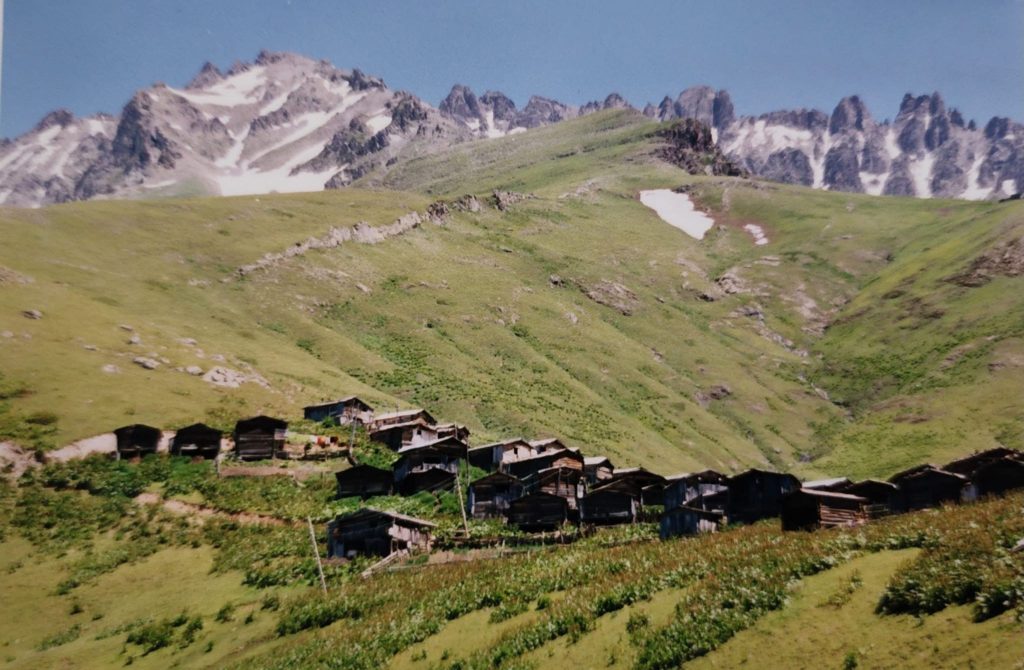
Bloody Germans
But Harald -good old Harald, every team has one- well, he was a know-it-all who always had a better way of doing things and wouldn’t let an argument die even when his aggravated British colleague was about to give him a good Schlag in the Mund. He also refused to drive the field truck (with hindsight, perhaps a good thing) which added to my workload because as the most experienced off-road driver in the group, the long drives along forestry roads fell to me. Harald aside, I was happy enough. The geology was excellent, the pay was good and the scenery even better, when you could see it through the heavy clouds that often blanket the region.
Geo Idiot
The volcanic rocks up there can be heavily altered, bleached yellow-orange in colour by natural acid generation from sulphides in the rock, suggesting the presence of useful metals like copper or zinc. It’s flashy looking stuff that lures geologists in like flies to warm cow shit, and even a geo-idiot like me can find something good to hammer. I was working for Rio Tinto out of their exploration office in Ankara. Using the modern miracle of satellite imagery, we’d identified several strong alteration zones in the area, and we were heading up to investigate what the cause might be but the weather wasn’t behaving itself and as we drove up, we drove into thick cloud. Our satellite photo guided us on to a steep, sodden grassy hill side criss-crossed with large ridges of hard, altered rock – intrusive dykes cutting the volcanics.
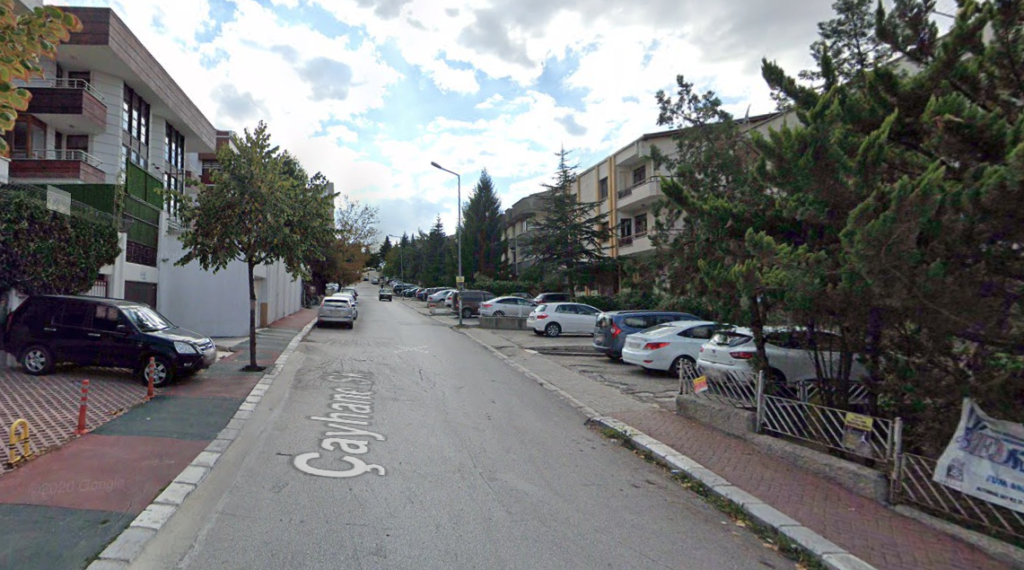
The prominent dykes blocked our path like so many walls, forcing us to climb over them or traverse around them; we slipped around in a cold, heavy wet fog punctuated by refreshing interludes of fine, cold, drizzly rain. Marvellous. Here and there, the volcanics were shot through with blobs and veinlets of silvery-blue molybdenum mineralization, so we’d found metal, but at that time moly wasn’t on our target list of economically interesting metals for Rio. Still, we had to do the follow up sampling just in case there was something else like copper to be found with the moly.
I’m Wet. Time To Go.
After half a day blundering around in the clouds my field notebook was damp, my clothes were damper, my hands were frozen and my pen wasn’t cooperating, refusing to write on the soggy notebook paper. We’d collected a few grab samples of possible mineralization but other than that, the day was a bit of a waste of time. It was time to fuck-off down the hill.
Heading into the mist, trudging forlornly back to the trucks with our rock-heavy backpacks, I heard a jolly tinkling sound that momentarily cheered me up; the distinctive clanging of the bells that the locals used to keep track of their sheep and goats in the forests or shitty weather. How bucolic, I thought. And then I remembered, where there’s sheep and goats, there’s dogs; the big white Anatolian shepherds known locally as Kangal’s and known informally by me as OhFuckNoRun.
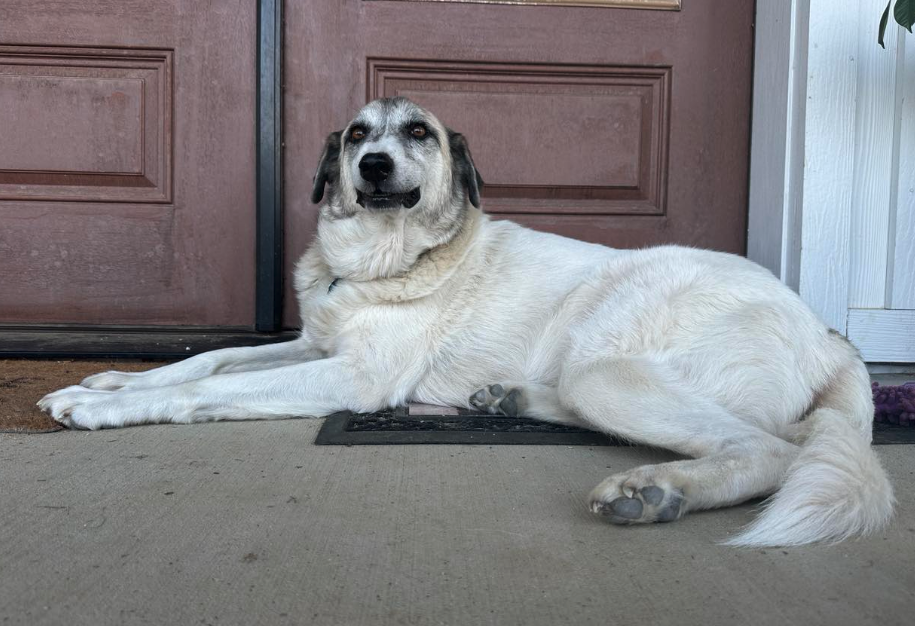
Zoot Alors
Sure enough, as the bells got louder and goats started to appear, a kangal materialised out of the fog, 150lbs of slobbery white death licking its chops. Thankfully Cujo kept a wary distance from us, watching everything we did with slimy tendrils of drool hanging from its massive jaws.
A minute later a human-like figure emerged from the fog, moving stiffly and wobbling from side to side like a triangular wooden board swaying in a breeze and shouting for the dog. A shepherd to be sure, but it wasn’t boy shaped. It was bigger and V-shaped and looked like the silhouette of someone struggling to walk in an overly starched Zoot suite; the exaggerated clothes that were popular amongst some groups in America in the 1940s.
What the fuck is that? I said in my best English English.
What ze fock is das? added Harald rather pointlessly but clearly better than me, in his best German-English.
Kepenek. Replied our Ahmed, which sounded impressive -whatever a Kepenek was- but I couldn’t be sure if he was naming the thing or telling us to run-like-fuck in Turkish.
The figure got closer and eventually a male voice called out “hello” to us in the local Laz dialect. The fog slowly gave way, and we were face to face with a weather-beaten old man wearing an off-white, rock-solid V-shaped poncho, the mysterious Kepenek, made from what appeared to be furry cardboard. It was big enough that he’d have had trouble walking safely in a strong wind. Wikipedia describes them thusly:
“A kepenek is a Turkish traditional shepherd’s outer garment. It is a sleeveless, buttonless garment made of felt worn on the shoulders and covering the whole body from shoulders down. It is made of three parts: one for the back and two (the same as the back, cut in half along the length) for the front. The parts are stitched together along the shoulder lines and all the way down. Usually white, a kepenek may have some adornments.”
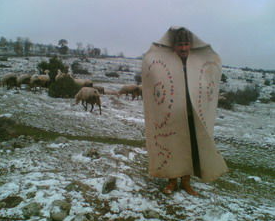
Enough Kepeneks, Let’s Go Home
After a few days up in the mountains on his own, the old man was incredibly friendly and desperate to talk to anyone who’d listen -no doubt telling us that his dog was just a big softie and wouldn’t ever bite us. He even spoke to Harald, who could only grunt, nod and smile whenever the shepherd paused, which was tricky for a German – the smiling I mean.
Increasingly wet, we headed off back to our truck and began to pack our stuff into the cramped Lada Niva. I was sealing up the sample bags with their disappointingly dull contents when I heard an engine approaching through the fog. It was working a bit too hard, slogging up from the valley below in very low gear. The road we were on was narrow and steep, hugging the hillside with switchback after switchback. It headed over the mountain tops northeast toward the border with Georgia and was used by a lot of Russians who travelled along it to the coastal city of Trabzon, crammed into minibuses, their roof racks loaded with cheap merchandise for the Russian market on Trabzon’s seafront.
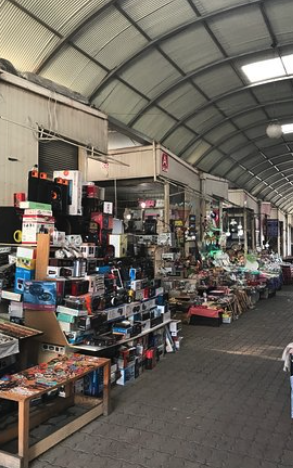
The Russians Are Coming
Sure enough, a minute later an ancient Russian van appeared labouring up the hill toward us loaded down with passengers and luggage. Most of windows were steamed up but the back ones were open and cigarette smoke poured out of them. Three men were squeezed into the front seat, chewing on cheap sliced bread and massive fatty sausages, and another dozen or so men and women were jammed into the rest of the bus. Huge blue bags and soggy cardboard boxes were strapped to the roof. They pulled over by our Lada and the bus ground to a squeaky halt as its occupants stopped to look at us.
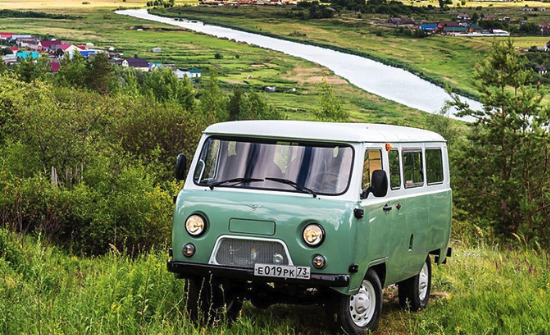
Animated Russian conversation spilled out of the back windows of the van. Eventually, the front passenger side window was rolled down and a fat, scruffy-looking man with brown teeth stuck his head out, a nasty-looking hand-rolled cigarette stuck to his lips. He waved Ahmed over, all wild arm gestures and broken Turkish. I understood enough to get the gist of the back and forth.
Who the bloody hell are they? said the fat man pointing at me and Harald.
Geologists, replied Ahmed. Foreigners. They are looking for copper and zinc.
Where they from? said Big Ivan.
Well, the tall handsome one with stylish glasses and slightly greying hair is from England, Ahmed said, But the annoying, badly dressed one that none of us like is German.
(Ok, some artistic license there. He didn’t say badly dressed.)
The chubby Russian looked at me and yelled
Inglees! Winston Churchill. Very goooood. Tankyou.
I waved a quick “thank you” type gesture back at him and smiled which seemed to please him.
Then he turned to Harald. Alleman? which was the word for “Germans” in that part of the world.)
Yes, replied Harald. I’m German. Ich bin Deustche.
There was a long pause, broken by some highly animated conversation from the back of the van. Then a second head emerged, this time from the rear side window. In heavily accented German mixed with English a loud voice called out:
Hey, Alleman! Fuck you! Ha ha ha! Hitler kaput. Deutschland kaput. Fuck you! Wiedersehen!
The head disappeared, both windows slammed shut and the van pulled noisily away to a cacophony of laughter and Russian insults directed at Harald from the back of the van. Through gritted teeth, I glanced over at Ahmed -who was struggling to breath he was laughing so hard- at which point I totally lost it. Well worth a day in the rain.
And remember…
This is a true story. One of many tucked away in my addled brain. I can (kinda) get away with German jokes because I’m half German. If you enjoyed this rare blog post (I’m about to pick up the pace again, trust me.. you’ll be sick of me soon) please subscribe using the slightly Teutonic looking subscription box at the top of this page. Sie werden nicht enttäuscht sein. Ehrlich.
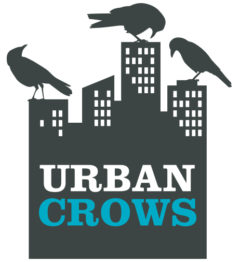
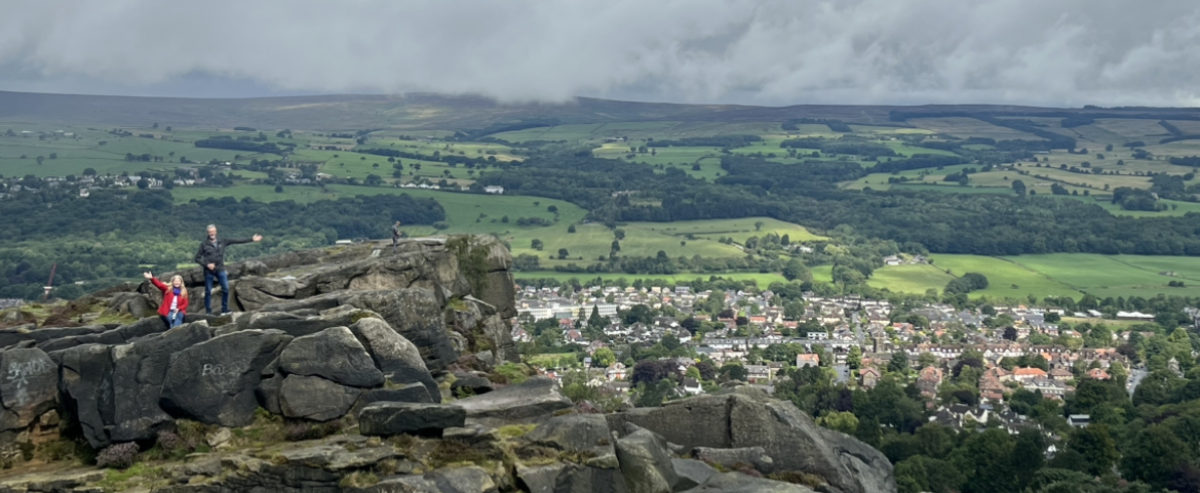
Haha, thanks for the memories, Ralph! That Russian market in Trabzon was quite something. I remember buying a cold-war SLR camera (didn’t actually work), medical instruments (in case we needed to perform open-heart surgery in the field) and a dense roll of thick-gauge tin foil that really was more like a police baton than a kitchen aid.
And a field of “monsters” that could emerge from the fog, as you descended from the prospective high ground into a tidy hazelnut grove, and you exhaled, knowing that your day of traversing (fumbling in the mists) was over, and a cup of ayran might be offered to you by the curious/suspicious but nevertheless hospitable farmer…
I bought multiple strings of cultured pearls for 5 bucks a string
Another excellent story Ralph. I’ve actually been in one of those shitty old Russian minibuses on a trip to look at some gold mines in norther Kazakhstan. What a week. Vodka, vodka and more vodka. One of the nights out in a very flash pub I drank all the Kazakhs under the table. One of them, an older bloke, had to plead with me to allow him to stop drinking!